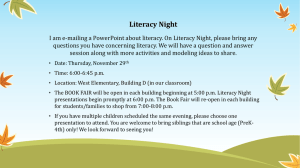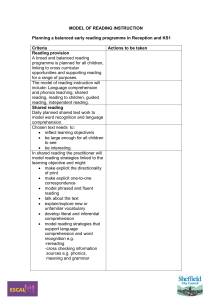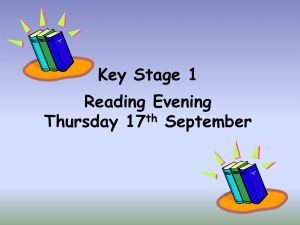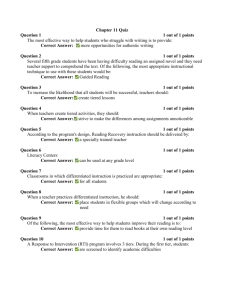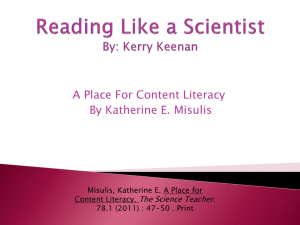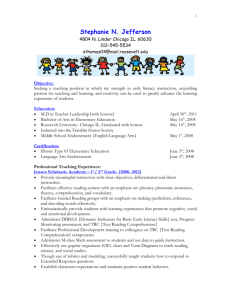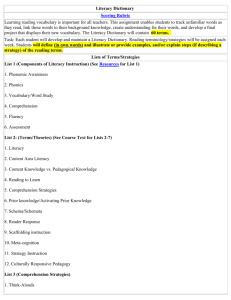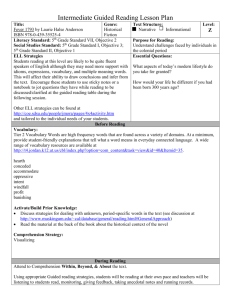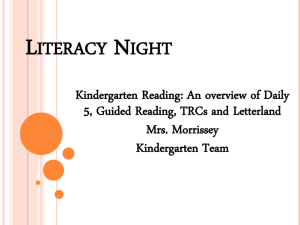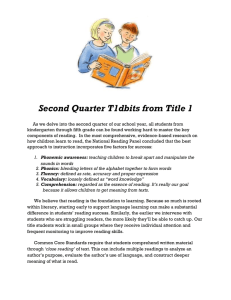Literacy Night (Please Read Before coming on Thursday)
advertisement
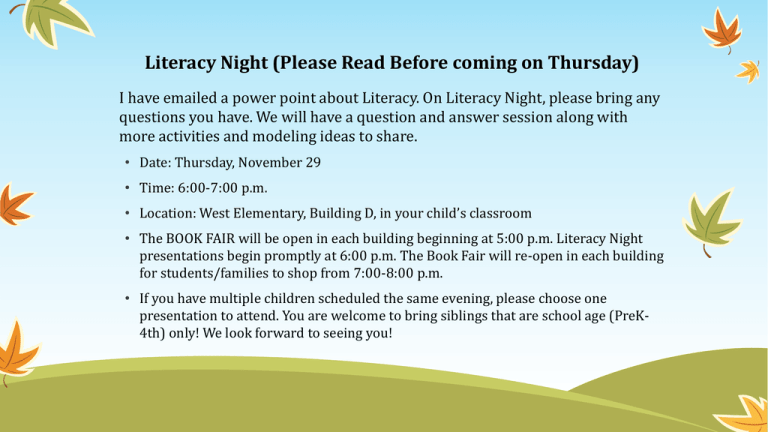
Literacy Night (Please Read Before coming on Thursday) I have emailed a power point about Literacy. On Literacy Night, please bring any questions you have. We will have a question and answer session along with more activities and modeling ideas to share. • Date: Thursday, November 29 • Time: 6:00-7:00 p.m. • Location: West Elementary, Building D, in your child’s classroom • The BOOK FAIR will be open in each building beginning at 5:00 p.m. Literacy Night presentations begin promptly at 6:00 p.m. The Book Fair will re-open in each building for students/families to shop from 7:00-8:00 p.m. • If you have multiple children scheduled the same evening, please choose one presentation to attend. You are welcome to bring siblings that are school age (PreK4th) only! We look forward to seeing you! Welcome to Literacy Night! Kindergarten Team! Guided reading groups • On the next few slides, you will notice a few pictures of your child participating in a guided reading group. A guided reading group is led by a teacher and it consists of a word work activity and an activity centered around a book. The book is usually one to two levels higher than their independent reading level since they are receiving support from a teacher. Sometimes the group will reread a book so students can gain fluency (and eventually read the book with no support.) Other times, a new book will be introduced. The word work activity generally focuses on letters, letter sounds, and building words. A readers response is when students are asked to write/draw evidence of their thinking. Tracking (pointing to each word as you read it) Using picture clues Picture walks (looking through a book before you read it so view the pictures and predict what the book may be about) Word Work and readers response Reading at a Glance! This is a snap shot of what our reading time may involve during the week. Whole Group Instruction Listening Center Phonics Anchor Charts Comprehension Computer Guided Reading Writing/Book Making Secret Stories Sight Word Games Songs Read the Room/Write the Room Daily Five/Literacy Centers Word Wall Big Books Phonics Games Word Work Individual Conferences Pocket Chart Share New Learning Read to Self/Buddy Reading Turn and Talk Reading Curriculum • Adopted series: The Comprehension Toolkit and Fountas and Pinnell Phonics • Hearing good literature-several stories and poems each day. • Have phonic and word attack skills instruction. • Participate in activities that extend the literature that has been read. • Vocabulary and comprehension. • Literature and author appreciation. • Independent reading. • Small group and individual reading with teacher guidance. • Skills including- beginning and ending consonants, short and long vowel sounds, phonics, reality and fantasy, cause and effect, making inferences, rhyming words, opposites, main ideas, compound words, predicting outcome. Reading • Independent Reading/Just Right Reading Level96% to 100% accuracy decoding words with comprehension. • Instructional/Guided Reading- 90% to 95% accuracy decoding words with comprehension. Typically one to two levels higher than just right reading level because students are receiving support. Common Language • Tracking-Pointing to each word as you read. • Connections-Text to Self (Text reminds you how it relates to your life.), Text to Text (Text reminds you of another book, movies, magazines, ETC.) • Chunking-Look for parts of words. Decode the word. • Tap it out-Touching each sound as you say the word. (Tactile Strategies) • Background Knowledge-Information that is already known. • Picture Clues-Looking at the picture to help with words of the story. • Inner Voice-This is what you are thinking while you are reading. Being mindful of what your brain is saying while you are reading. The picture in your head. • Making Predictions- Using clues to foretell what may happen throughout the story. • Turn and Talk-A way to actively engage students as the teacher checks for understanding. Volume • Reading and re-reading lots of books that are at their just right reading level • Independent Reading/Just Right Reading Level- 96% to 100% accuracy decoding words with comprehension. Three Ways to Read • Read the pictures • Read the words • Retell the story Secret Stories • You will hear your student talking about Secret Stories. These are stories that help students learn sounds that a group of letters make (phonics). This helps build our balanced reading & writing program. Visualizing • Each day, our students are bombarded with the visual images of TV and video games. In contrast, most students view reading as a passive activity. But a simple technique-visualization-can transform students of all ages from passive to active readers: visualization can help students cross the boundary to improved comprehension. • As you read a short passage, describe images you see in your mind. For example, you might use the following quote from Where the Wild Things Are: “That very night in Max’s room a forest grew and grew and grew until his ceiling hung with vines and the walls became the world all around.” • After reading that quote, share with your child the images you visualized as you read it…”As I read that passage, I thought about the words and I imagined what the characters looked like, what they were doing, and what their surroundings were like. I imagined a window with a moon shining through it. Saplings began to sprout and quickly grew leaves and stems. (The scene was like those time-lapse photography images you see on the Discovery Channel). I saw little vines spreading their tendrils down the walls and across the ceiling. Before I knew it, the entire room was green and leafy, and much darker than before.” • After several times doing this, let your child tell you what they are picturing in their own minds. Inner Conversations (Thinking While Reading) • Inner conversation is probably the most important strategy for children to develop. It is essential for them to begin comprehending the text they read, rather than merely running their eyes over the words and pages. Inner Conversation is essentially the conversation that takes place in your head during reading or hearing a story being read to you. • Sometimes we ask ourselves questions about the text, sometimes we laugh or maybe we get confused by what we just heard. Whatever the inner conversation may be, we want our children to become aware of these thoughts and communicate them with us. As a parent you can encourage these thoughts by asking your child questions, before, during, and at the end of the story, while you read to them. The good news is when we notice our thinking we are more apt to learn! Let’s start thinking! Web Sites for Literature • www.raz-kids.com • (Our School Media Website) http://www.jenksps.org/vnews/display.v/SEC/West%20Elementary • http://kids.tulsalibrary.org/ • www.starfall.com • http://www.seussville.com/ • http://kids.nationalgeographic.com/kids/ • http://www.abcya.com/ • http://www.abcmouse.com/ • http://www.scootpad.com/ Thank you for coming! Please visit the Scholastic Book Fair!
